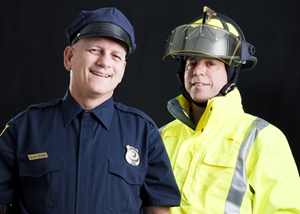While the job of first responders can be extremely stressful and require frequent stress alleviation, it is of equal importance that servicemembers are in good physical health. Consuming a healthy diet and getting a sufficient amount of exercise are crucial to keeping a sharp mind and maintaining the ability to tackle any challenges that may lie ahead.
Physical fitness should complement servicemembers' efforts to ensure that they do not let the stress of their jobs take a toll on their health. Here are five tips to help first responders keep an eye on their well-being while working in a physically and mentally demanding environment.
1. Maintain a healthy diet
The food people consume every day has a major impact on all aspects of their health. First responders should be sure to eat meals that contain the proper amount of nutrients. It may be tempting, due to busy schedules, to get a quick bite at a fast-food restaurant on the road. However, it's essential to include vegetables and fruits in your diet, as these have the vitamins, minerals and fiber that people need to function at their best and stay healthy.
The Centers for Disease Control and Prevention recommended that middle-aged men and women who partake in frequent physical activity each day consume around 2.5 cups of fruit and 4 cups of vegetables daily. Foods that are low in fat and calories are best at ensuring that bodies are prepared for physically demanding job roles.
2. Perform aerobic activities
As a firefighter, policeman or EMT, it is of the utmost importance that you are in shape and able to respond to emergencies quickly and efficiently. According to the CDC, body reaction and exertion are responsible for 38 percent of on-site injuries experienced by emergency medical service workers. Everything from running to climbing is a possibility every day for emergency responders. Including aerobic activities, such as running and swimming, in regular workouts will improve their ability to effectively serve the community.
3. Do regular muscle exercises
The CDC noted that 50 percent of injuries experienced in fireground operations are muscular strains and sprains. Including daily stretches and muscle-strengthening exercises in workouts will help prevent these injuries.
4. Make use of available resources
There are many programs designed to support first responders in their efforts to remain physically fit. For example, the National Volunteer Fire Council has started the Heart-Healthy Firefighter Program for firefighters across the country, providing tools and resources that help maintain physical and mental well-being. The organization also assists fire departments in creating health and wellness programs. Local facilities like the YMCA often give first responders discounts to encourage them to stay in shape as well.
Similarly, the Health and Wellness Guide for the Volunteer Emergency Services by the Federal Emergency Management Agency is a popular resource used by servicemembers looking for general information on how to stay healthy while serving the community.
5. Balance physical and mental health
Physical and mental health are closely linked. Stress can cause your muscles to contract and your heart rate to increase, which allows servicemembers to react quickly in emergency situations. However, when this stress is carried outside of work into family life, people may experience difficulty falling asleep and relaxing with loved ones. To help leave stress at work, it can be beneficial to make time to relax your body.
Simply tensing and relaxing muscles from the head to the toes once a day can significantly reduce your body's tension. Meanwhile, taking a mental break for 15 to 20 minutes each day, whether you do something like listen to music or meditate, will put your mind at ease.

